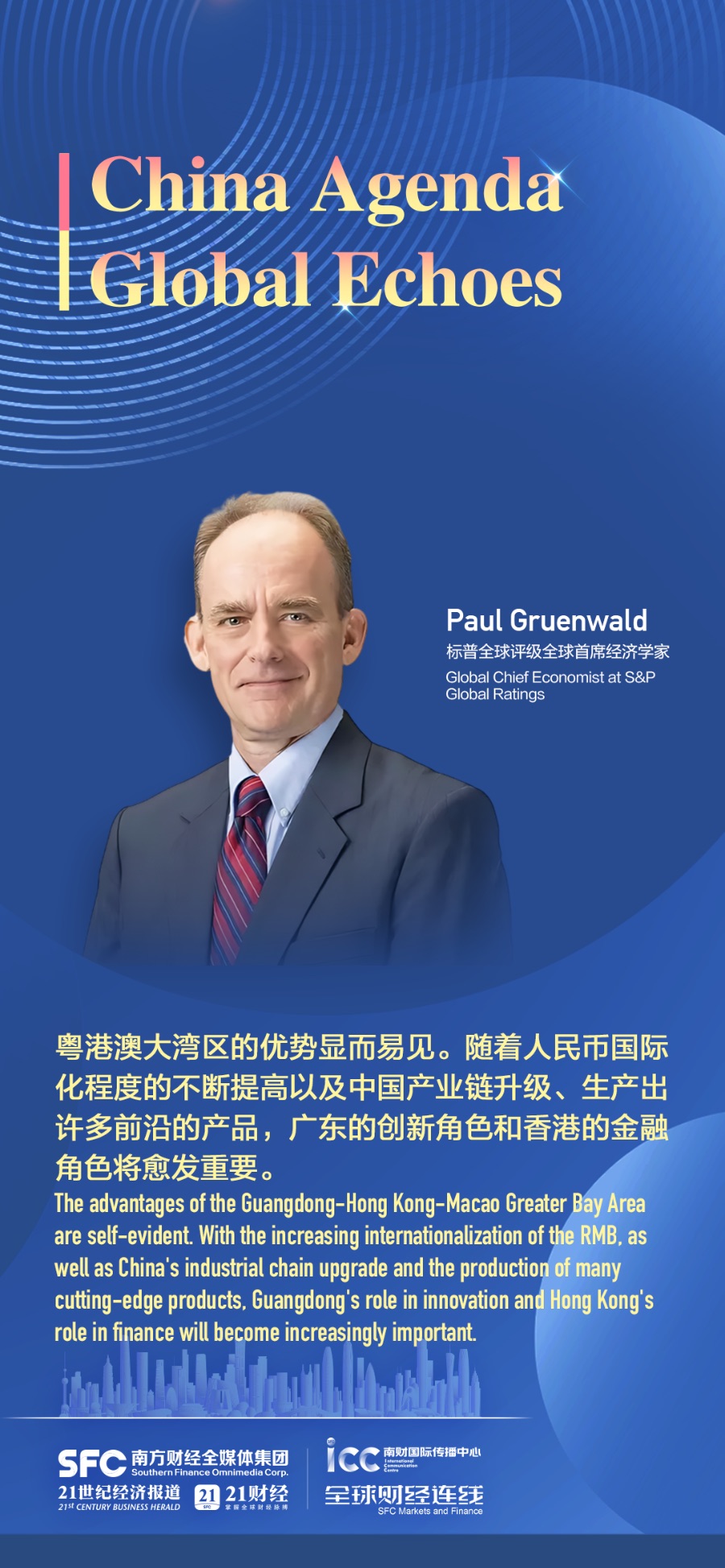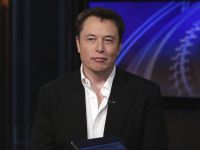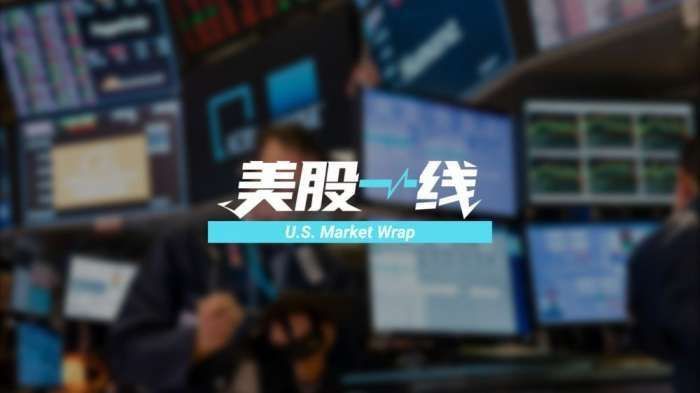南方财经全媒体集团全国两会报道组 施诗、杨雨莱 北京、广州报道
The "Two Sessions" has officially kicked off in Beijing on March 4. This year's government work report set China's economic growth target of 2025 around 5%.
Paul Gruenwald, the Global Chief Economist at S&P Global Ratings has joined an exclusive interview with SFC journalist to delve deep into China’s economy progress and technological innovation.
For China’s economy outlook, Paul Gruenwald considered there's many bright spots for the Chinese economy, still being one of the fastest growing major economies in the world. He points out that China continues to make progress on batteries, and solar and wind and renewable.
And he also showed great surprise towards the emerging innovations such as DeepSeek. "China to come up with something that was in the same league with less sophisticated chips and a lower footprint was quite an accomplishment."
The Guangdong-Hong Kong-Macao Greater Bay Area in the southern part of China has continued its transformation from a manufacturing hub to a global innovation center, boasting eight industrial clusters valued at over one trillion yuan and another ten worth over 100 billion yuan.
“The Greater Bay Area has been a development region.” Paul Gruenwald considered the advantages of the Greater Bay Area are self-evident. With the increasing internationalization of the RMB, as well as China's industrial chain upgrade and the production of many cutting-edge products, Guangdong's role in innovation and Hong Kong's role in finance will become increasingly important.
Some parts of Chinese economy looks vibrant
SFC Markets and Finance: How about the Chinese economy?
Paul Gruenwald: China is in a kind of interesting position right now. We know about the structural challenges,but at the same time, we're continuing to see successes out of the Chinese economy.
So we've just got the DeepSeek, (it) has been a big surprise and something that people didn't think was possible, bringing high quality AI out of sort of lesser set of resources, chips, etc., that points to the strength in the economy. We know about the success of the electric cars. China continues to make progress on batteries, and solar and wind and renewable.
So our view is outside of the property sector, which is large in China, the manufacturing and productivity story is still pretty good. Some parts of the Chinese economy looks pretty vibrant.
There's still some bright spots for the Chinese economy. And again, still the fastest growing major economy in the world.
SFC Markets and Finance: How can Chinese economy continue to keep its momentum?
Paul Gruenwald: Growth is all about productivity. So if countries are going to continue to advance and prosper, we have to have continuous productivity gains. And you can only do so much investment in capital deepening and China's labor forces starting to slow, which is what we're seeing in Japan and some of the countries in Europe. So the driver of growth has to be productivity.
So the question or the challenge is to make sure to continue to have high growth. China needs to continue to have high productivity growth. Again, we've just mentioned a few sectors where that's happening, but that needs to be sustained over a long period of time.
Another good example is actually the U.S., because the U.S. is outperforming many of the advanced countries after COVID-19 for the last few years. And a lot of that is productivity. We're seeing good productivity in the U.S. growth, the economy as well, and we're not seeing it in Europe. And again, that's driving this wedge between the two.
So, it's same kind of arithmetic applies to China. If you're going to continue to grow quickly and keep up with the competition, it's got to come from productivity.
China has moved up the value chain quickly
SFC Markets and Finance: Are you shocked by DeepSeek?
Paul Gruenwald: I think it's fair to say, there were a lot of surprises here in the U.S. about DeepSeek. Everyone was focusing on the U.S. tech firms and we know about the restrictions on some of the high-end chips to China. So the fact that DeepSeek was able to do this with apparently fewer resources and a lower environmental footprint was super interesting. We know the technology has got all this promise and there's kind of a race going on, a competition, but there's also the energy part of data centers, which is not moving in the direction of sustainability because they're going to be powered by natural gas here in the U.S. So for China to come up with something that was in the same league with less sophisticated chips and a lower footprint was quite an accomplishment.
We'll have to see where it goes. But the short answer was yes. There are a lot of surprise here. DeepSeek is open source. So everything they did is publicly available. So I still think we're kind of early days on all this stuff. So it's going to be super interesting and important how this all plays out. I think DeepSeek is a sample for China's high-quality development.
SFC Markets and Finance: So what's your comment on China's high-quality development?
Paul Gruenwald: That's another thing. I lived in Asia for a while. I actually lived in Hong Kong about 20 years ago, and it wasn't that long ago where China was exporting and producing relatively low-end products. So it were backpacks, shoes and footwear and then China has moved up the value chain quite quickly.
I don't think that has fully been appreciated by some people. But if you look at what China's producing, and we've discussed a couple of those in the last few minutes, whether it's gen-AI or electric vehicles or batteries, Chinese firms are at the cutting edge at all of those. So I think that's definitely success. China has offloaded some of the lower end industries to places like Vietnam and other Southeast Asian countries, which is what's supposed to happen as you move up the value chain. But it's hard to disagree with the notion that China in some of these key industries now is very cutting-edge.
The GBA has a lot of innovation and dynamism
SFC Markets and Finance: As you mention, you spent several years in Hong Kong. You may know some about the Guangdong-Hong Kong-Macao Greater Bay Area. What impression does the Greater Bay Area leave on you?
Paul Gruenwald: Hong Kong plays a special role. It's a kind of the financial gateway to China for the rest of the world. So I think that's always been Hong Kong strength. I know there's been the Greater Bay Area, which has been sort of a development region, but for Hong Kong in particular, it's going to be the financial services and the onshore center for offshore money if that's the right way to put it. But there's also a lot of innovation and dynamism around Guangdong and that part of China. So, I mean, all of that comes together that sort of makes sense.
SFC Markets and Finance: What role do you think the Greater Bay Area can play in the world?
Paul Gruenwald: As the RMB becomes a more internationalized currency and as China moves up the value chain for a lot of these cutting-edge products, you have the financial role of Hong Kong and the innovation and role of Guangdong. So I think without knowing too many of the details for me, as someone who spent some time in that region, those would be kind of the obvious advantages of that area.
RMB has made a lot of progress as a trade currency
SFC Markets and Finance: You said RMB becomes a more internationalized currency. How do you think about the future of RMB internationalization?
Paul Gruenwald: The dollar has been really sticky as the world's reserve currency. It's come down a bit. If you look at the rankings of the global currencies, U.S. is still pretty clearly on top followed by the Euro. And then there's another group, the RMB is in that group, the Pound Sterling, Canadian dollar, Australian dollar.
RMB has made a lot of progress as a trade currency. So as China goes out into the world through Belt and Road Initiative and other initiatives, a lot of bilateral trade is now taking place in RMB. So its role as a trade currency being one side of a trade transaction has risen quite a bit.
I think looking forward, I would expect it to continue to be used in trade transactions as China builds up its trade and supply network, but maybe a question mark around some of the other stuff. The dollar doesn't necessarily have to be the number one currency forever. But dollar has been surprisingly sticky and resilient. So I think we're still in a dollar world for the foreseeable future.
 Chief Producer: Yu Xiaona
Chief Producer: Yu Xiaona
Supervising Producer: Shi Shi
Editor: He Jia
Reporter: Shi Shi, Yang Yulai
Video Editor: Cai Yutian
New Media Coordination: Ding Qingyun, Zeng Tingfang, Lai Xi, Huang Daxun
Overseas Operations Supervising Producer: Huang Yanshu
Overseas Content Coordinator: Huang Zihao
Overseas Operations Editors: Zhuang Huan, Wu Wanjie, Long Lihua, Zhang Weitao
Produced by: Southern Finance Omnimedia Group




















